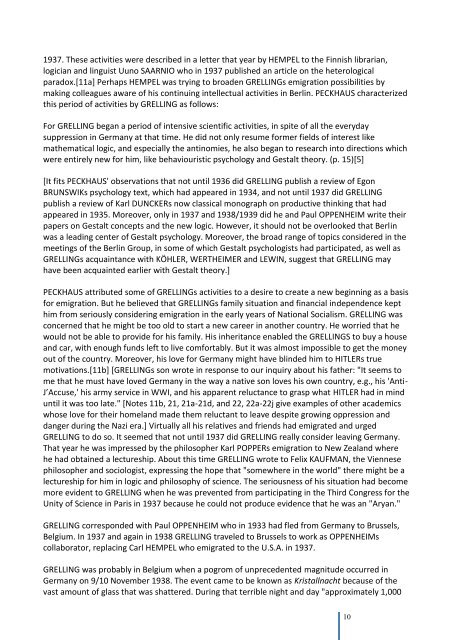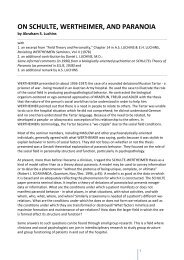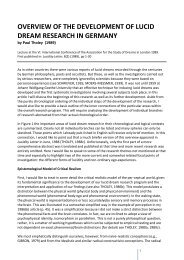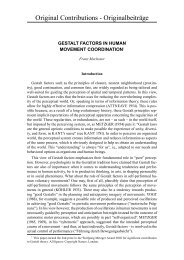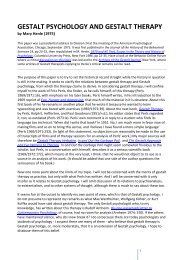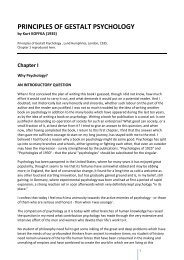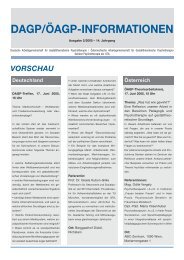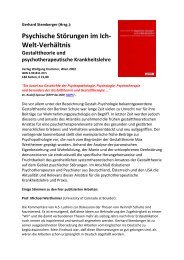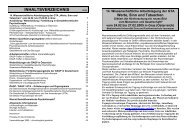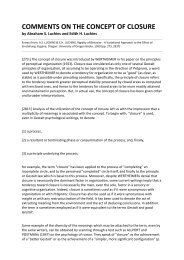pdf-Download - Society for Gestalt Theory and its Applications (GTA)
pdf-Download - Society for Gestalt Theory and its Applications (GTA)
pdf-Download - Society for Gestalt Theory and its Applications (GTA)
Create successful ePaper yourself
Turn your PDF publications into a flip-book with our unique Google optimized e-Paper software.
1937. These activities were described in a letter that year by HEMPEL to the Finnish librarian,<br />
logician <strong>and</strong> linguist Uuno SAARNIO who in 1937 published an article on the heterological<br />
paradox.[11a] Perhaps HEMPEL was trying to broaden GRELLINGs emigration possibilities by<br />
making colleagues aware of his continuing intellectual activities in Berlin. PECKHAUS characterized<br />
this period of activities by GRELLING as follows:<br />
For GRELLING began a period of intensive scientific activities, in spite of all the everyday<br />
suppression in Germany at that time. He did not only resume <strong>for</strong>mer fields of interest like<br />
mathematical logic, <strong>and</strong> especially the antinomies, he also began to research into directions which<br />
were entirely new <strong>for</strong> him, like behaviouristic psychology <strong>and</strong> <strong>Gestalt</strong> theory. (p. 15)[5]<br />
[It f<strong>its</strong> PECKHAUS' observations that not until 1936 did GRELLING publish a review of Egon<br />
BRUNSWIKs psychology text, which had appeared in 1934, <strong>and</strong> not until 1937 did GRELLING<br />
publish a review of Karl DUNCKERs now classical monograph on productive thinking that had<br />
appeared in 1935. Moreover, only in 1937 <strong>and</strong> 1938/1939 did he <strong>and</strong> Paul OPPENHEIM write their<br />
papers on <strong>Gestalt</strong> concepts <strong>and</strong> the new logic. However, it should not be overlooked that Berlin<br />
was a leading center of <strong>Gestalt</strong> psychology. Moreover, the broad range of topics considered in the<br />
meetings of the Berlin Group, in some of which <strong>Gestalt</strong> psychologists had participated, as well as<br />
GRELLINGs acquaintance with KÖHLER, WERTHEIMER <strong>and</strong> LEWIN, suggest that GRELLING may<br />
have been acquainted earlier with <strong>Gestalt</strong> theory.]<br />
PECKHAUS attributed some of GRELLINGs activities to a desire to create a new beginning as a basis<br />
<strong>for</strong> emigration. But he believed that GRELLINGs family situation <strong>and</strong> financial independence kept<br />
him from seriously considering emigration in the early years of National Socialism. GRELLING was<br />
concerned that he might be too old to start a new career in another country. He worried that he<br />
would not be able to provide <strong>for</strong> his family. His inheritance enabled the GRELLINGS to buy a house<br />
<strong>and</strong> car, with enough funds left to live com<strong>for</strong>tably. But it was almost impossible to get the money<br />
out of the country. Moreover, his love <strong>for</strong> Germany might have blinded him to HITLERs true<br />
motivations.[11b] [GRELLINGs son wrote in response to our inquiry about his father: "It seems to<br />
me that he must have loved Germany in the way a native son loves his own country, e.g., his 'Anti-<br />
J’Accuse,' his army service in WWI, <strong>and</strong> his apparent reluctance to grasp what HITLER had in mind<br />
until it was too late." [Notes 11b, 21, 21a-21d, <strong>and</strong> 22, 22a-22j give examples of other academics<br />
whose love <strong>for</strong> their homel<strong>and</strong> made them reluctant to leave despite growing oppression <strong>and</strong><br />
danger during the Nazi era.] Virtually all his relatives <strong>and</strong> friends had emigrated <strong>and</strong> urged<br />
GRELLING to do so. It seemed that not until 1937 did GRELLING really consider leaving Germany.<br />
That year he was impressed by the philosopher Karl POPPERs emigration to New Zeal<strong>and</strong> where<br />
he had obtained a lectureship. About this time GRELLING wrote to Felix KAUFMAN, the Viennese<br />
philosopher <strong>and</strong> sociologist, expressing the hope that "somewhere in the world" there might be a<br />
lectureship <strong>for</strong> him in logic <strong>and</strong> philosophy of science. The seriousness of his situation had become<br />
more evident to GRELLING when he was prevented from participating in the Third Congress <strong>for</strong> the<br />
Unity of Science in Paris in 1937 because he could not produce evidence that he was an "Aryan."<br />
GRELLING corresponded with Paul OPPENHEIM who in 1933 had fled from Germany to Brussels,<br />
Belgium. In 1937 <strong>and</strong> again in 1938 GRELLING traveled to Brussels to work as OPPENHEIMs<br />
collaborator, replacing Carl HEMPEL who emigrated to the U.S.A. in 1937.<br />
GRELLING was probably in Belgium when a pogrom of unprecedented magnitude occurred in<br />
Germany on 9/10 November 1938. The event came to be known as Kristallnacht because of the<br />
vast amount of glass that was shattered. During that terrible night <strong>and</strong> day "approximately 1,000<br />
10


